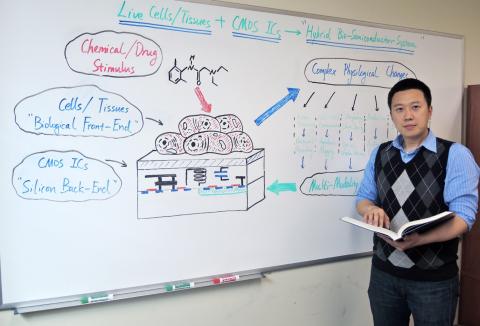Semiconductor Research Corporation (SRC) has awarded a Georgia Tech team with a three-year research contract to develop the next-generation of high-performance biosensors as part of SRC’s new Semiconductor Synthetic Biology (SSB) research program.
Semiconductor Research Corporation (SRC) has awarded a Georgia Tech team with a three-year research contract to develop the next-generation of high-performance biosensors as part of SRC’s new Semiconductor Synthetic Biology (SSB) research program. The team was awarded $475,000, including the contributions from both SRC and the State of Georgia.
Hua Wang and Mark P. Styczynski, assistant professors in the School of Electrical and Computer Engineering (ECE) and School of Chemical and Biomolecular Engineering, respectively, will investigate how to fuse actual live cells or tissues with CMOS electronics to form a hybrid bio-semiconductor system. This system would provide novel biosensors with high signal sensitivity and specificity while at a very low operating power. According to Wang, the major applications of this technology include low-cost drug development, fast chemical screening, and personalized medicine.
In such a hybrid bio-semiconductor system, Wang envisions live cells or tissues serving as the "Biological Front-End" to interface with the physical environment and the CMOS integrated circuits functioning as the "Silicon Synthetic Back-End" to convert the cellular responses to electrical signals for information processing and storage. “This system will open the door for novel sensing, actuation, and even signal processing capabilities beyond existing silicon platforms,” said Wang. “If I may draw an analogy between our hybrid biosensor and a radio-frequency receiver, these live cells in our sensors are actually functioning as ‘biological’ front-end filters and low noise amplifiers, which select and amplify the desired biochemical information.”
Led by SRC’s Global Research Collaboration, the SSB program concentrates on synergies between synthetic biology and semiconductor technology that can foster exploratory, multi-disciplinary, longer-term university research leading to novel, breakthrough solutions for a wide range of industries. Results from the university research, guided by semiconductor industry needs, should significantly enhance and accelerate opportunities for advancing properties, design and applications for future generations of integrated circuits. The Georgia Tech team was one of six U.S. university groups to receive funding from the SSB program, which is supporting exploratory projects in cytomorphic-semiconductor circuit design; bio-electric sensors, actuators, and energy sources; and molecular-precision additive fabrication.
“I am very excited that our Georgia Tech team was selected as a winning team for this SRC program.” Wang said. “Our world-class infrastructure in electronics research and the strong interdisciplinary collaborations at Georgia Tech really helped us win this SRC opportunity.”
